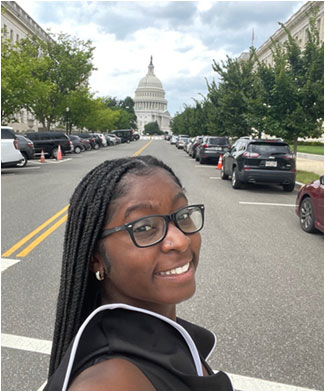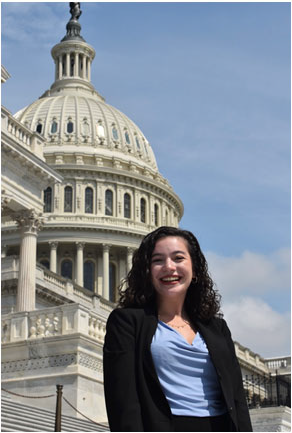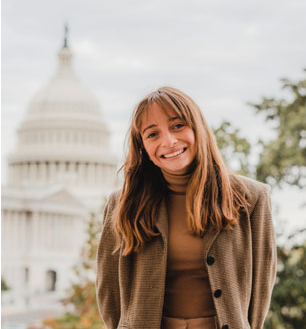This year was pivotal for many Women’s Studies students who used their Washington D.C. internship opportunities to put their knowledge to the test. “Experiential learning opportunities allow students to take theories and knowledge gained in the classroom and apply them in a practical setting while developing professional work experience,” says Dr. Alyssa Zucker, the Department’s Experiential Learning Coordinator.
How pivotal was the experience? We thought we would let the students tell you in their own words.
Edwidge Labbe

My name is Edwidge Labbe and I am a third-year student at the University of Florida studying Political Science and Women’s Studies on the pre-law track.
This year, my summer break looked a little different… I spent my summer working in the Nation’s Capital, interning with Congresswoman Federica Wilson (FL-24). To say the least, it was an interesting time to be in Washington, D.C. as a Women’s Studies major. I began my internship in May, 2022 and by this time, the Court’s opinion in Dobbs v. Jackson Women’s Health Organization had already been leaked. It was not until the end of the Court’s term that they released the official decision, ultimately deciding to repeal Roe v. Wade.
At the time, I lived a five minute walking distance from the Capitol and the Library of Congress and every morning up until the decision got released, there would be activists from both sides, as well as the occasional presence of Representatives, chanting outside of the Court as its 10-foot barricades stood tall.
Living in D.C. was quite tumultuous; however, I could not have been more grateful to occupy that space given the background that I have in the topic and being able to suggest ‘good’ policy initiatives for the people and communities that will be negatively impacted by the overturn of Roe. Throughout my Women’s Studies career, my biggest takeaways have been the concept of intersectionality and access. As we move forward in this post-Roe society, I think legitimate conservations are to be held surrounding what access looks like, who is able to access services, and what that looks like across racial and economical lines.
Zoe Terner

This past summer, I had the incredible honor to intern with United States Congressman Ted Deutch’s Washington, DC office. My first week, the decision in Dobbs v. Jackson overturning the long-held federal right to an abortion came down. Congressman Deutch read the headline aloud to the office, and I wrote the response he shared on his social media later that day.
That very same day, parents of victims from the shooting at Marjory Stoneman Douglas High School in Parkland, Florida were on the Hill. Congressman Deutch represents Broward County, which includes Parkland, and has been a steadfast champion of gun violence prevention in the wake of the shooting in 2018. He had invited the families to join him in anticipation of a vote on the first bipartisan piece of gun violence prevention legislation in over thirty years. I accompanied the families, and stood next to them as they waited in a room in the Capitol to hear the vote. We talked about this fight, and the power of persistence. I watched them from the East Steps as they stood behind Speaker Pelosi and she announced that the legislation, finally, had passed both houses of Congress and was headed for the President’s desk.
The East Steps are right across the street from the Supreme Court. To my front was an incredible victory, a moment that these parents had advocated for in the face of heartbreak I hope to never be able to even imagine. To my back was the Supreme Court, where thousands of protestors were already gathering to mark the removal of a constitutional right to abortion, something U.S. women had counted on for almost 50 years.
After my internship, I moved from DC to North Carolina to start as a 1L at Duke Law. As a law student, I knew that I wanted to gain the legal knowledge to put into practice the things I learned as a Women’s Studies student. My senior year, I spent time with my Women’s Studies classmates thinking about what it means to create change when the systems around us are irreparably broken. We talked about pursuing a world that is more whole, more just– and how we can begin to do that in the face of such enormous systemic harm. In the few short months I’ve been at law school, I’ve been able to begin to do that: I’ve drafted expunction petitions, helped tenants fight against their negligent landlords, and taken calls from voters reporting intimidation and suppression on Election Day.
As I work towards becoming a lawyer, I remind myself constantly of the feeling of standing on the corner of progress and setback, hope to my front and devastation behind me. It’s true that there is so much work to do. But it’s also true that we have the power to do it. I’m so grateful to the incredible mentors and professors in the Women’s Studies Department who gave me the tools to create change, and for the work that they do every day to bring us closer to a world of justice.
Paulina Trujillo

I am a third year undergraduate majoring in Political Science with minors in Mass Communications and Women’s Studies. During my internship on Capitol Hill I have extensively engaged with federal public policy. I spent Fall 2022 interning in the office of Lois Frankel. My office worked on negotiating the terms of the Speak Out Act and moving it forward. The act bans Non-Disclosure Agreements (NDAs) at the pre-dispute stage. I conducted a policy memo on NDAs. NDA policy is important to create a space for survivors to speak out. It is also important to understand the intersection between gender and race when addressing this issue. The bill was passed in the house in November, and signed into law by President Biden on December 7th, 2022.
In addition, I conducted research projects for the legislative team to assist in moving legislation. One of these pieces of legislation is the Keep Girls In School Act. I have been an advocate for this legislation since 2019 when I came to DC for a leadership summit through the United Nations’ organization Girl Up. Further, I have read lengthy reports on women in the workplace, summarizing ways to promote diversity and how childcare helps close the gender pay gap.
My time in Capitol Hill was an enriching experience, an opportunity for which I’m grateful. I have learned how federal gender policy seeks to address the needs of marginalized communities. This is the topic that my independent study for the Women’s Studies department focused on. Without a doubt, I hope to work in a space where I can influence the future of public policy and uplift marginalized communities. The future of public policy is oriented by intersectional feminism.
This story appears in the Fall 2022 issue of the Gender, Sexualities, & Women’s Studies Newsletter. Read more from the issue.